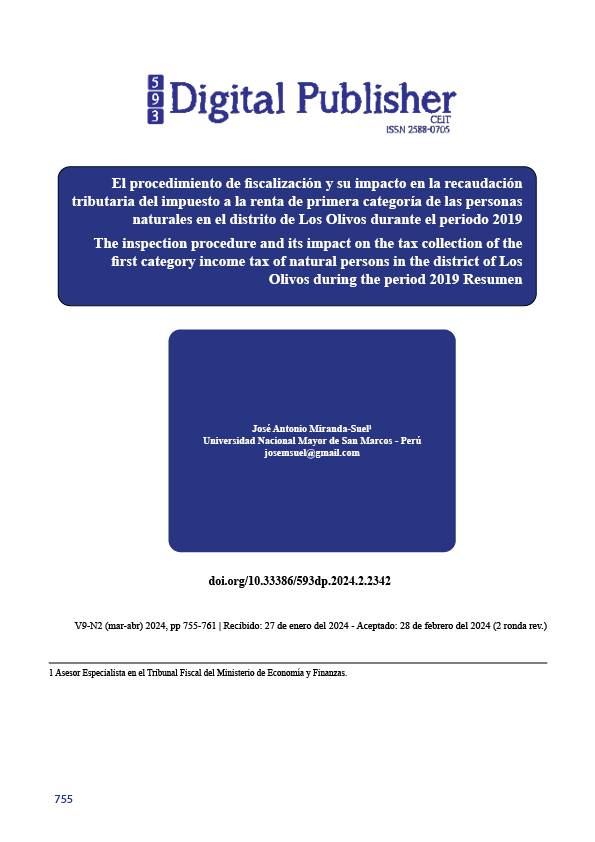The inspection procedure and its impact on the tax collection of the first category income tax of natural persons in the district of Los Olivos during the period 2019
Main Article Content
Abstract
The primary aim of this research was to examine the inspection process and its correlation with tax collection, particularly in the context of First Category Income Tax. The goal was to raise awareness among Peruvians about the significance of fulfilling their tax obligations, including the aforementioned tribute, as well as other obligations, in order to contribute to the country's development. This text provides information on the tax inspection procedure, tax collection, issues related to tax evasion, the lack of awareness and/or tax culture, and the efforts made by the State to address this problem. It also offers recommendations to enhance our understanding and compliance with tax obligations, and emphasizes the significance of curbing tax evasion. As responsible citizens, it is our duty to contribute towards this cause.
The research has been of a non-experimental and quantitative design, with a descriptive-correlational scope and the technique used will be the survey. The investigation was specifically directed at natural persons obliged to pay the First Category Income Tax, during the period 2019. Especially, at the lessors of real estate in said jurisdiction, among whom, 40 of them were chosen, in order to obtain a sample in order to achieve the objectives of this research.
The research findings demonstrate that the tax audit system directly influences the collection of first category income tax from people in the Los Olivos region. Put simply, a more effective tax audit system leads to a more beneficial collection of first category income tax, and the opposite is also true.
Downloads
Article Details

This work is licensed under a Creative Commons Attribution-NonCommercial-ShareAlike 4.0 International License.
1. Derechos de autor
Las obras que se publican en 593 Digital Publisher CEIT están sujetas a los siguientes términos:
1.1. 593 Digital Publisher CEIT, conserva los derechos patrimoniales (copyright) de las obras publicadas, favorece y permite la reutilización de las mismas bajo la licencia Licencia Creative Commons 4.0 de Reconocimiento-NoComercial-CompartirIgual 4.0, por lo cual se pueden copiar, usar, difundir, transmitir y exponer públicamente, siempre que:
1.1.a. Se cite la autoría y fuente original de su publicación (revista, editorial, URL).
1.1.b. No se usen para fines comerciales u onerosos.
1.1.c. Se mencione la existencia y especificaciones de esta licencia de uso.
References
Bernal, C., & Pérez, E. (2019). Estrategias de la SUNAT para Combatir la Evasión Fiscal: Un Enfoque desde la Perspectiva Legal. Anales de Derecho, 27(3), 56-73.
Hernández, R., F. C., & Baptista, P. (2014). Metodología de la investigación. Editorial McGraw Hill Education.
Lahura, L. (2016). Desafíos en la Recaudación de Impuestos: Un Enfoque desde la Economía Comparada. Journal of Public Finance, 21(4), 112-130.
Medina, P. (2018). La Fiscalización Tributaria y la Recaudación de Arbitrios en la Municipalidad de San Juan de Lurigancho en el periodo 2014 – 2016.
Ramírez, C. (2023). Política tributaria y formalización de las micro y pequeñas empresas en Lima Metropolitana. Revista Quipukamayoc, 36(65), 53-60.
Reategui, S. (2021). Análisis de la Legislación Tributaria y su Impacto en la Recaudación Nacional. Revista de Derecho Fiscal, 18(1), 134-150.
Risco, J. (2020). Impacto de la Fiscalización Tributaria en la Recaudación del Impuesto a la Renta: Un Estudio de Caso en el Distrito de [Nombre del Distrito]. Revista de Economía y Finanzas, 25(2), 45-62.
Superintendencia Nacional de Aduanas y de Administración Tributaria. (s.f). ¿Qué entiendo por Rentas de Primera Categoría?
Superintendencia Nacional de Aduanas y de Administración Tributaria. (2020). Renta de Primera Categoría.
Vega, Y. (2016). Incidencia de la Evasión de Impuestos en la recaudación tributaria de Microempresas Rubro comercial en el Distrito Olivos caso CODRY SAC.-2015. Universidad Católica los Ángeles de Chimbote.
Vela, G. (2017). Cultura Tributaria y Responsabilidad Ciudadana: Un Estudio de Caso en el Área Metropolitana de Lima. Journal of Tax Ethics, 12(2), 89-104.
Vera, M. (2019). Efectividad de los Procedimientos de Fiscalización Tributaria en la Recaudación de Impuestos Municipales: Un Análisis Comparativo entre Distritos Urbanos. Journal of Tax Research, 15(3), 78-95.


